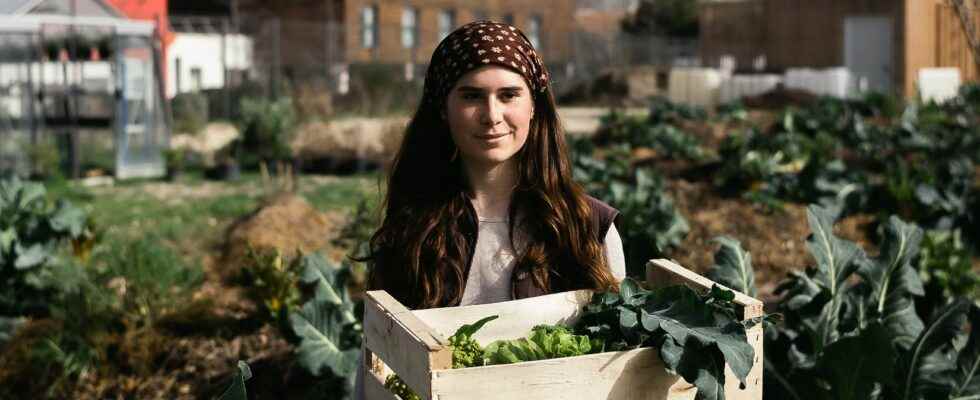A micro farm in Avignon
A nursery, an edible forest, growing areas, a canteen, a performance stage, a ceramics workshop, a chicken coop, a composting site… Located on a 5,000 square meter plot in place of a college in a priority area of Avignon, the Tipi (acronym for “Ideal Land for the Imagination”) uses urban agriculture to bring together different activities and populations. “The objective is to attract beyond the public already sensitive to environmental issues”, explains Paul-Arthur Klein, co-founder of the association Les Jeunes Pousses, at the origin of this initiative. Opened in September 2020, the first urban farm in Vaucluse has already welcomed 11,000 people, the equivalent of 10% of the population of Avignon.
Fruits and vegetables in Paris
It will be the largest urban rooftop farm in Europe. Planned on the roofs of the hangars of the Capital’s exhibition center, the Urban Nature project will eventually extend over 14,000 square meters, the equivalent of two football pitches. A third of this area is already exploited in pavilion 6 and supplies restaurants and supermarkets in the surrounding area. Advantages ? “An excellent carbon footprint thanks to organic production, local delivery and water-efficient operation”, lists Pascal Hardy, the founder of Agripolis, a company specializing in urban agriculture and partner of the project. In addition, 156 vegetable plots of one square meter are offered for rent to local residents wishing to cultivate a plot of land.
Goats fifteen minutes from Lyon
After a career in mass distribution, devoted in particular to selling insecticides, Clément Huret, 34, decides to give up everything to raise goats. And this not at the bottom of a remote valley of the Massif Central but in Limonest, about ten kilometers north of Lyon. A municipality in the Monts d’Or, an upscale suburb of the capital of Gaul, determined to support farmers to fight against land pressure. She rents the walls of the farm to the young farmer who owns the equipment and the livestock. “It’s much more affordable that way and, above all, I’m helping to preserve this magnificent setting,” says Clément Huret. He sells his organic cheeses in markets, restaurants and grocery stores. Far, very far, from pesticides…
Vertical greenhouses in Romainville
The two glass towers of three and six floors stand out in the middle of the HLMs of the Marcel-Cachin district of Romainville (Seine-Saint-Denis). A symbol of the revival of these large complexes, the Cité maraîchère is a municipal facility, opened in January 2021, dedicated to vertical agriculture, without a hold on the ground. Every Wednesday, residents can come and buy organic and seasonal harvests there at prices adapted to their income (discounts can reach 75%). “We seek less to feed the population than to carry out social and ecological action”, testifies Yuna Conan, its director. The place hires and accompanies people far from employment while frequently organizing educational visits for the general public and schools.
Mushrooms in Floirac
In this town bordering Bordeaux, the Cycloponics company operates the 3,000 square meters of unusual cellars in a building bar to grow oyster mushrooms, shitakes, button mushrooms and even endives. Humidity and the absence of light are suitable for these crops planted in straw bales. The production, certified organic, is sold in a short circuit to the shops of the surroundings by this company which began its activity in a bunker in Strasbourg in 2016 before developing in Paris and, soon, in Lyon. “We pay rent to social landlords for spaces that previously cost them money,” says Jean-Noël Gertz, its co-founder. A win-win deal.
